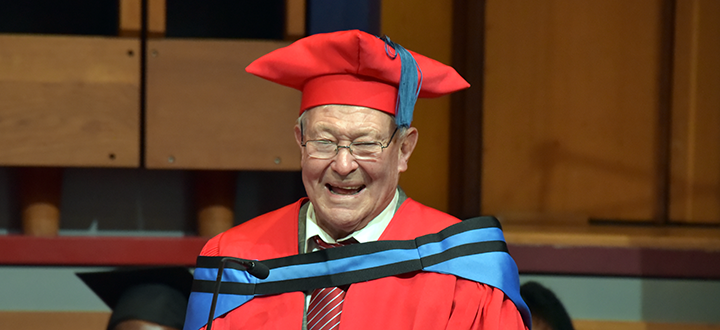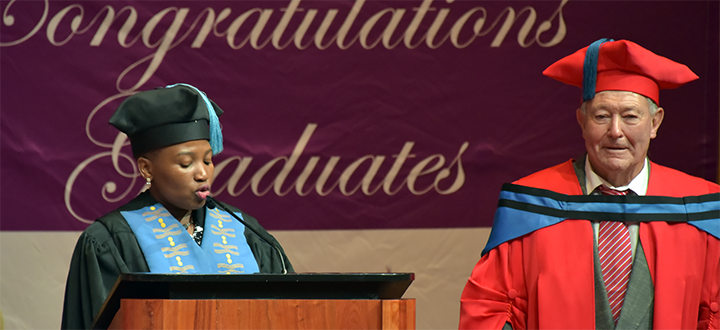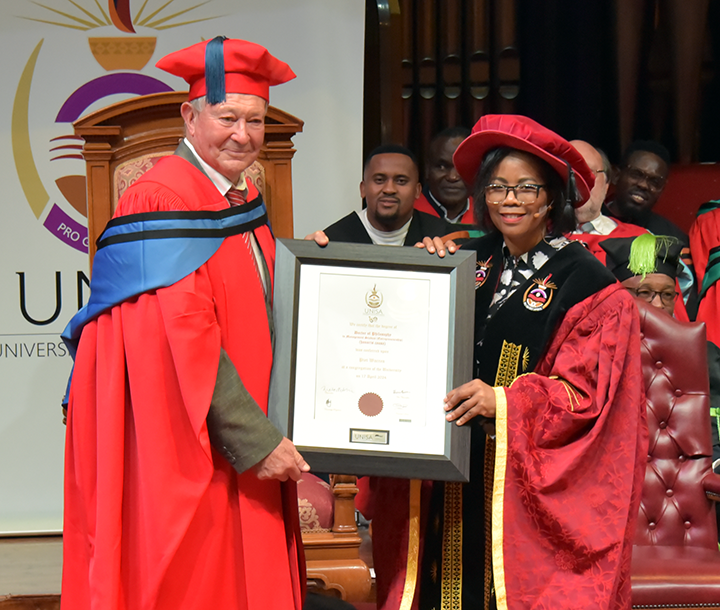News & Events
Community champion and agricultural entrepreneur extraordinaire honoured by Unisa
On 17 April 2024, Unisa awarded the degree of Doctor of Philosophy (Honoris Causa) to Piet Warren in recognition of his profound impact on agricultural sustainability, community empowerment and economic development, but also for inspiring future generations to pursue sustainable development and inclusive growth.

Honouree Piet Warren addressed the audience in both Xitsonga and English to loud cheers from an appreciative audience
Introducing the honouree, Dr MaseTshaba Mantepu, Executive Dean of the College of Economic and Management Sciences, said that Warren is a figure of immense stature in the agricultural sector. She continued: “Affectionately known as Makhoma in the Mopani District, Limpopo, Piet Warren’s profound impact on the local community, innovative practices in cattle farming, and contributions to sustainable agriculture have set him apart as a leader and a visionary, not only in the field of agriculture, but also in the areas of business management, supply chain and entrepreneurship”.
As a renowned red meat producer, Warren’s operations have evolved significantly over time, extending to a comprehensive fresh meat value channel.
“Warren’s deep-rooted connection with the district, underpinned by his fluency in Xitsonga and his understanding of local cultures, have enabled him to make a tangible difference in the lives of local farmers,” said Mantepu. “His efforts to integrate indigenous knowledges with modern agricultural practices have been pivotal in advancing the United Nation’s Sustainable Development Goal 2, which is creating a world free of hunger by 2030, and the African Union Agenda 2063 in the region.”

Dr MaseTshaba Mantepu, Executive Dean of the College of Economic and Management Sciences, introducing Piet Warren
Mantepu said that through shared distribution and the creation of an employment trust, Warren has empowered his employees and local farmers, aligning their successes with those of his operations. “This approach not only motivated his team to achieve extraordinary results but has also fostered a sense of community and shared purpose,” she concluded.
In addition to his agricultural achievements, Warren’s community involvement extends to supporting local sports and development initiatives, as well as mentorship of local communal property associations.
In his acceptance speech, Warren said that he was humbled and deeply honoured by the prestigious honorary doctorate awarded to him.
Warren described his journey from humble beginnings in Gravelotte, Limpopo, where he commenced with small-scale cattle farming on leased land immediately after high school. Ever the entrepreneur, he overcame numerous challenges to eventually start a butchery, a feed lot, and an abattoir, in the Giyani and Phalaborwa districts, while conducting sustainable, profitable farming. His activities created many jobs and his enterprise employed community members over many decades.

Piet Warren formally receiving the degree of Doctor of Philosophy (Honoris Causa) from Prof Puleng LenkaBula, Unisa Principal and Vice-Chancellor
“The major expansion of cattle farming in the region gave rise to a new industry – that of game farming,” said Warren. “I commenced to breed game to meet the demand created by the hunting fraternity, specifically the breeding of sable antelope which were at the time quite scarce”.
Warren spoke passionately about the need for conservation to protect species and ensure sustainable game farming, and lamented the dire situation around rhino poaching.
Warren said that the significance of the honorary doctorate awarded to him exceeds personal achievement. “It serves as a powerful reminder of the critical role entrepreneurship plays in driving sustainable development, particularly in the domain of agriculture. The role that entrepreneurship can play in the upliftment of rural communities cannot be underestimated. I am living proof thereof.”
In conclusion, he expressed the hope that this honorary doctorate will serve as a lasting reminder to those in authority who are responsible for creating the right framework for entrepreneurship to flourish, and that it will also serve as a development incentive. “As we confront the complex challenges of the future in food security, climate change and rural development, entrepreneurship emerges as the catalyst for positive change, unlocking new pathways to prosperity and sustainability.”
* By Philip van der Merwe, Editor, Department of Institutional Advancement
Publish date: 2024/04/19
